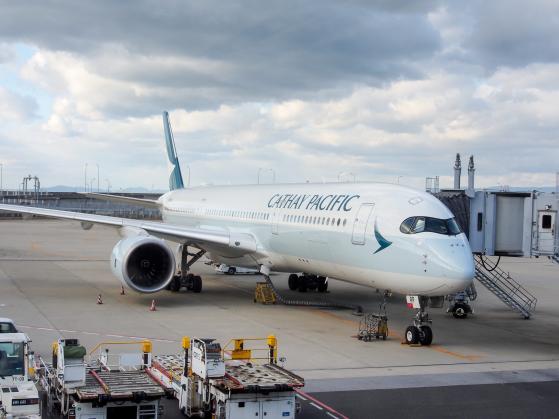Invezz.com - Cathay Pacific Airways, Hong Kong’s flagship carrier, has cancelled dozens of flights and initiated a comprehensive inspection of its Airbus A350 fleet following the discovery of a critical engine component failure.
The issue was detected on a flight from Hong Kong to Zurich, which was forced to return to its home base.
This incident has raised concerns within the aviation sector and led to a sharp decline in Rolls-Royce (LON:RR) shares, the British company responsible for manufacturing the engines that power the A350 aircraft.
The impact of this inspection is expected to disrupt Cathay Pacific’s flight operations over the coming days.
Rolls-Royce shares tumble 8.8%
Shares in Rolls-Royce Holdings, the sole provider of engines for the Airbus A350 long-haul aircraft, dropped by 8.8% following Cathay Pacific’s announcement of the engine issue.
The failure was discovered in a Trent XWB-97 engine, the largest jet engine produced by Rolls-Royce, installed on an A350-1000 model.
The incident has triggered uncertainty about the reliability of these engines, prompting Cathay to ground affected planes and initiate a fleet-wide inspection.
According to the airline, this is the first instance of such a failure in any A350 aircraft worldwide.
Cathay Pacific cancels 24 flights
Cathay Pacific has cancelled 24 flights, significantly affecting its operations, as it conducts precautionary inspections of its 48 A350 aircraft.
The airline reported that several engines on different aircraft require component replacements. Spare parts have been sourced, and repairs are currently underway.
The inspection, coordinated with the Hong Kong Civil Aviation Department, Airbus, and Rolls-Royce, is likely to keep several aircraft out of service for days, potentially leading to further flight cancellations.
This move is seen as a proactive measure to ensure passenger safety and prevent future incidents.
Investigation into Trent XWB-97 engine failure begins
Cathay Pacific, along with Airbus and Rolls-Royce, is collaborating with aviation regulators to investigate the cause of the engine component failure.
The affected engine, a Trent XWB-97, experienced issues shortly after takeoff, forcing the aircraft to return to Hong Kong International Airport after only 75 minutes in the air.
The A350-1000 model, powered by the Trent XWB-97, is one of two variants of the A350 family, known for its long-haul capabilities.
Industry experts suggest that while the A350 is considered very safe, supply chain challenges and logistical delays may be affecting the availability and durability of certain engine components.
Impact on other airlines from Cathay’s A350 grounding
The grounding of Cathay Pacific’s A350s for engine inspections could have a ripple effect across the aviation industry, particularly for other carriers operating similar models with Trent XWB-97 engines.
Airlines and engine manufacturers, such as Rolls-Royce, often rotate engines across fleets to match maintenance schedules, adding complexity to resolving these issues promptly.
The disruption could also influence the availability of spare parts and increase maintenance costs, as airlines strive to avoid similar grounding scenarios.
Other airlines operating the A350 have reported varying scales of similar issues, with experts warning of potential extended disruptions due to manpower shortages.
Ongoing engine challenges for Boeing (NYSE:BA) and Airbus
The recent incident involving Cathay Pacific’s A350 adds to the ongoing challenges facing the aviation sector, particularly in engine manufacturing and maintenance.
Boeing, a major competitor of Airbus, has faced its share of engine-related problems, most notably with the 777X aircraft.
Earlier this year, Boeing paused testing of its 777X aircraft after discovering an issue with a structural component between the engine and the plane’s wings.
This problem resulted in further delays for the aircraft’s commercial launch, now pushed to 2025.
Both Boeing and Airbus are under pressure to address these issues swiftly to maintain their reputations for safety and reliability.
Rolls-Royce’s response to Cathay Pacific’s findings
Rolls-Royce has confirmed it is “working closely” with Cathay Pacific, Airbus, and aviation authorities to address the engine component failure.
While the company did not provide specifics on the exact nature of the problem, it acknowledged the issue with the Trent XWB-97 engine used in the Cathay flight.
Rolls-Royce’s London-traded shares fell by over 6% following the announcement, reflecting investor concerns over the potential financial and reputational impact.
The company has faced criticism for the durability of its engines, notably from industry leaders such as Tim Clark, President of Emirates, who raised concerns at the Dubai Airshow last year.
Cathay Pacific’s proactive measures
Cathay Pacific’s decision to ground its Airbus A350 fleet for inspection underscores the airline’s commitment to safety and operational integrity. While the disruption is significant, particularly given the ongoing challenges faced by airlines globally, the proactive approach may help prevent more severe incidents in the future.
As the aviation industry grapples with ongoing supply chain and maintenance challenges, airlines, manufacturers, and regulators must work collaboratively to ensure the safety and reliability of aircraft and engines.
This article first appeared on Invezz.com
